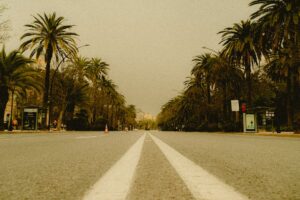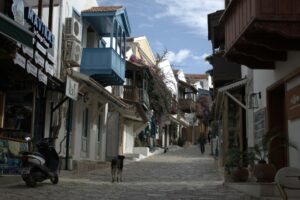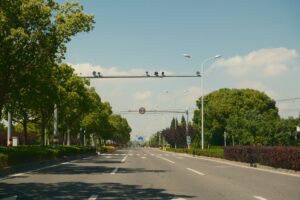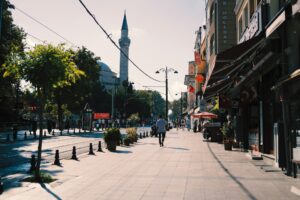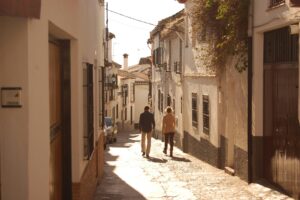
We continued our course west, up the broad river,—which has the appearance of an estuary, the country being flat and wooded on either side,—until, rounding a point, we began to steer due south, in the direction whence the river takes its rise, three hundred miles or so away. (In the Wilds of Florida by W.H.G. Kingston) 注:「私たち」は船で川を移動しています。
動画の後半部分でリスニング用音声が流れます。
英文を前から読んでいくために、語句のかたまりを作ります。こんな具合に課題文をスラッシュ(斜め線)で区切ります(スラッシュリーディング)。語句のかたまりを意識すると、リスニングで英語の意味をつかむのが楽になります。
We continued our course west, up the broad river,—/(関係代名詞の前)which has the appearance of an estuary,/(コンマの後)the country being flat and wooded on either side,—/(接続詞の前)until, rounding a point, we began to steer due south,/(前置詞の前)in the direction whence the river takes its rise,/(コンマの後)three hundred miles or so away.
語句のかたまりを前から訳していきます。
We continued our course west, up the broad river,—
私たちは西へと、幅広い川をさかのぼり続けた
which has the appearance of an estuary,
川の外観は河口を思わせる
the country being flat and wooded on either side,—
両岸が平坦で樹木が茂っているので
until, rounding a point, we began to steer due south,
やがて、ある岬を回ってから、私たちは進路を真南に向けはじめた
in the direction whence the river takes its rise,
その川の水源がある方へ
three hundred miles or so away.
約300マイル離れた
We continued our course west, up the broad river,—which has the appearance of an estuary, the country being flat and wooded on either side,—until, rounding a point, we began to steer due south, in the direction whence the river takes its rise, three hundred miles or so away.
until→ 「〜までずっと」という意味もありますが、この場合は「やがて〜」「ついに〜」と訳せます。
whence→ 関係副詞で「(〜から)―する」という意味です(先行詞は the direction)。the direction whence the river takes its rise =「その川の水源がある方向」
私たちは西へと、幅広い川をさかのぼり続けた。両岸が平坦で樹木が茂っているので、川の外観は河口を思わせる。やがて、ある岬を回ってから、私たちは進路を真南に向けはじめた。その方向には、約300マイル離れた場所に川の水源がある。
We continued our course west, up the broad river,—which has the appearance of an estuary, the country being flat and wooded on either side,—until, rounding a point, we began to steer due south, in the direction whence the river takes its rise, three hundred miles or so away.
今回の課題文では、分詞構文が2つ使われています。
the country being flat and wooded on either side→ 独立分詞構文です。分詞構文の主語として the country が ing形の前に置かれています。「〜ので」と訳せます。
rounding a point→ 普通の分詞構文です。主語は主節の主語 we と同じです。「〜してから」と訳せます。

